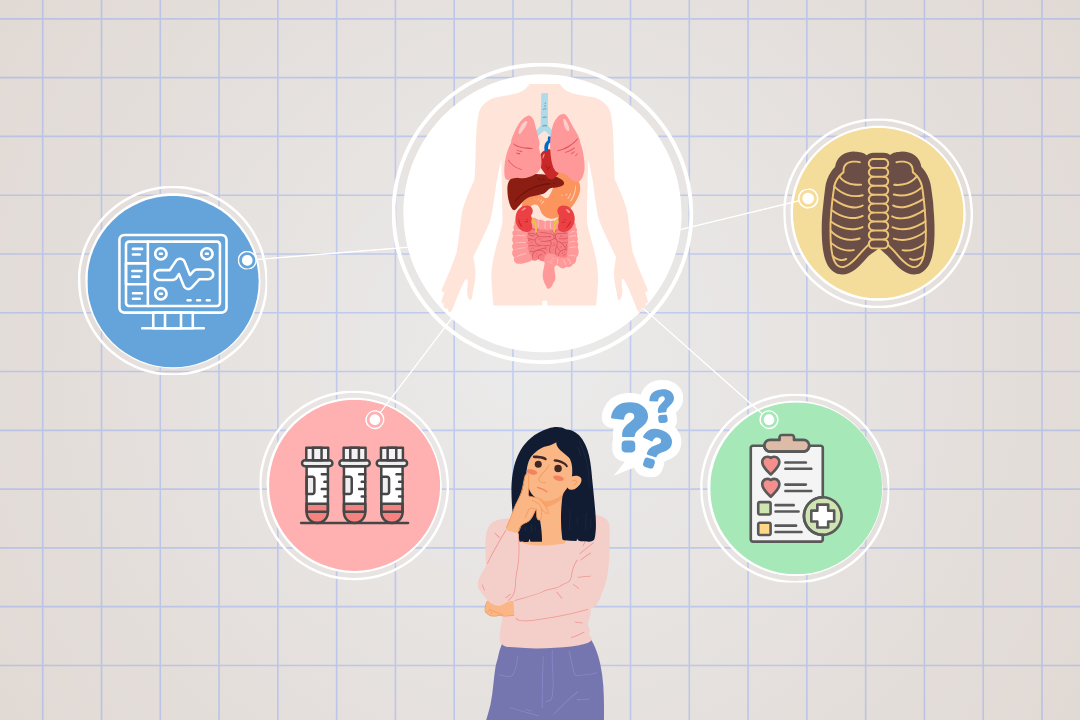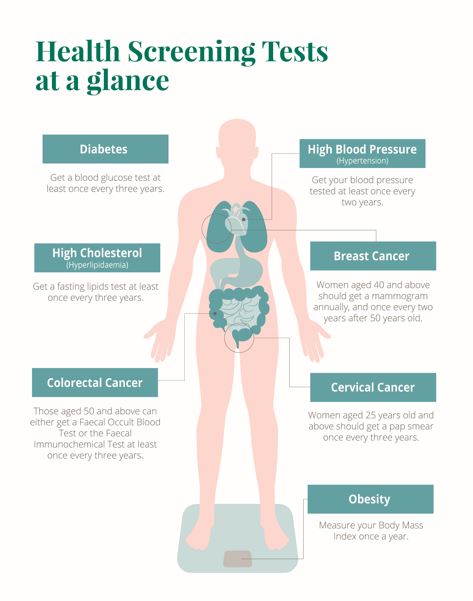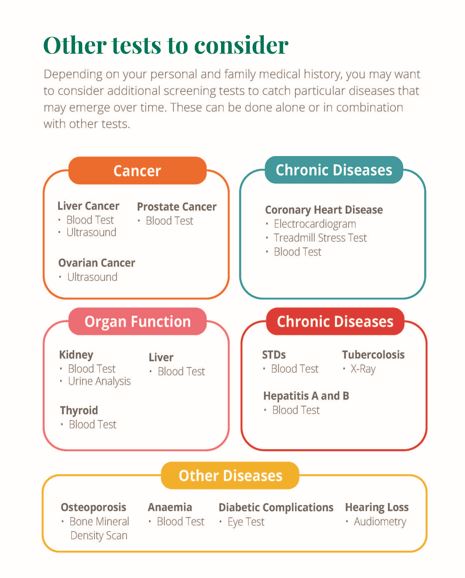Your Guide to Health Screening Tests in Singapore

Getting the correct health screening tests or package is tricky business. If you do a quick search about this topic on the Internet or online forums, you will often see questions like “Which health screening tests do I need, and which package will you recommend?”
With so many health screening packages available at different price points out there, it could be confusing to decide which package or tests best cater to your needs and budget.
So, where do you begin? Read on to find out more.
- Health Screening Tests: The More the Better?
- Essential Diseases to Test For
- Other Health Screening Tests to Consider
- In-depth Health Screening Packages
Health Screening Tests: The More the Better?
While you may want to get screened for every single disease using all available screening tools to get a ‘clean bill of health’, it is not necessary.
Not only will that burden your wallet (since additional screening tests will cost more), but some tests — like cancer markers — may produce false positive results, which may create unnecessary alarm for you.
You should always understand the purpose of each test before choosing a health screening package. If you have specific health concerns or a strong family history of certain diseases, discuss them in advance with your doctor to ascertain the right screening package to get. This way, you can be assured that you are screened for appropriate diseases using the necessary tests.
Returning for a post-examination review with your doctor after getting your health screening results is also equally important. Your doctor can help interpret your health screening results, address your concerns, and advise on the next steps.
Essential Diseases to Test For

Regardless of which health screening package you choose, make sure it tests for these diseases:
- Diabetes
One in three Singaporeans are at risk of developing diabetes. While not fatal, undiagnosed or uncontrolled diabetes can lead to heart disease, blindness, and other disabilities. You can screen for diabetes with a fasting blood sugar level test, which requires you to fast for eight to 10 hours prior. - High Cholesterol (Hyperlipidaemia)
Too much cholesterol in your body can narrow your arteries and increase your risk of heart disease and stroke. You can get a fasting lipids blood test to measure your cholesterol levels. Similar to the blood sugar test, you will need to fast eight to 10 hours before your test. Alternatively, non-fasting lipids tests can also be done because the results have been validated to be not significantly different from fasting. - High Blood Pressure (Hypertension)
Left undetected and uncontrolled, high blood pressure can damage your body over time, eventually causing heart diseases, stroke, and kidney failure. Most health screening packages will include a blood pressure test. - Obesity
Your BMI is a good indicator of obesity. Obese people are at higher risk of developing diseases, such as diabetes, high cholesterol (hyperlipidaemia), hypertension as well as certain cancers. By keeping your BMI in the healthy range, you will also reduce your risk of such diseases. The hip-waist-ration measurement should also be included. - Colorectal Cancer (for adults aged 50 and above)
The top cancer among men and the second most common among women, colorectal cancer is usually tested using the Faecal Occult Blood Test (FOBT) or Faecal Immunochemical Test (FIT). Your stools will be tested for hidden blood, which is a possible indicator of colorectal cancer. If your test turns out positive, your doctor may order for extra tests, such as a colonoscopy, to confirm the presence of colorectal cancer. - Breast Cancer (for females aged 40 to 69)
Breast cancer is the top cancer among women. All women are at risk of getting breast cancer, and the chances of developing it increases with age. Your risk increases if you are aged 50 and above, or have a family history of breast cancer. A mammogram is done to screen for breast cancer. It detects for microcalcifications in your breasts, which are tiny dots of calcification seen in early breast cancer. To confirm the results, your doctor may order for additional imaging tests or a biopsy that involves removing some of your breast tissue for analysis. - Cervical Cancer (for females)
Cervical cancer is highly treatable if detected early, and a Pap smear is used to screen for abnormalities. During the procedure, your doctor will collect cell samples from your cervix. All sexually active women aged 25-29 and above should get a Pap smear done once every three years. HPV test is done for women 30 years and above, and the test is only required once every five years for a normal test result.
Other Health Screening Tests to Consider
Some may prefer getting a holistic view on their health by going for a full body checkup. When doing so, ensure that your health screening package screens for the following three components: chronic diseases, cancers, and certain infectious diseases.

Here are some additional tests found in comprehensive health screening packages. They could also be available as optional add-on tests that you can consider including.
- Hepatitis A and B Screening Tests
Hepatitis A is a viral infection that causes the liver to become enlarged, inflamed, and tender. The virus is excreted in faeces, and transmitted through contaminated food and water. On the other hand, hepatitis B is a more serious liver infection. People with hepatitis B are also at a higher risk of developing liver cancer. It is spread through direct contact with the blood or body fluids of an infected person. In Singapore, around one in 35 adults are hepatitis B carriers. If you are not a carrier and are found to be free of hepatitis B after screening, consider getting vaccinated to protect yourself from this disease. - Sexually Transmitted Infections (STIs) Tests
Commonly encountered STIs include gonorrhoea, chlamydia, syphilis, and the human immunodeficiency virus (HIV). If you have multiple sexual partners, frequent high risk sexual encounters, or are experiencing irregular genital discharge, rashes, or ulcers, get yourself screened as soon as possible. - Complete Blood Count
This test measures the composition of red blood cells, white blood cells, haemoglobin, and platelets in your blood. It evaluates your overall health and detect a wide range of disorders, including anaemia, infections, and leukaemia. - Kidney Function Tests
These tests assess your kidney function by measuring the level of urea, creatinine (waste products), and certain dissolved salts such as sodium and potassium bicarbonate in your blood and urine. - Liver Function Tests
These tests are useful in diagnosing liver disease or monitoring liver damage by measuring the levels of certain enzymes and proteins in your blood. Some tests also measure the performance of your liver in producing protein and clearing bilirubin, a type of waste produced by your blood. - Thyroid Function Tests
Thyroid hormone tests assess your thyroid gland function. The thyroid gland creates hormones such as thyroxine (T4) and triiodothyronine (T3), which regulate the way your body uses energy and affect your metabolic rate. - Urinalysis
A urinalysis is a urine test to detect and manage a wide range of disorders such as urinary tract infections, kidney disease, and diabetes. It involves checking the appearance, concentration, and content of your urine. - Uric Acid Level Test
A high uric acid level in your body may increase your risk of gout or kidney stones. Uric acid is produced during the breakdown of purines, which are created in your body and found in certain foods. Once produced, it is carried by your blood and passes through your kidneys, which is eventually filtered out as urine. - Bone Mineral Density (BMD) Test
This is a painless and non-invasive procedure that measures your bone calcium to detect early loss of bone mass, and evaluates your risk of developing osteoporosis. While older people above 65 years old are more likely to develop low bone mass and osteoporosis, these can happen to younger people too. BMD testing is especially important for people at higher risk of osteoporosis, such as:- People with low body weight
- People above 65 years old
- People with personal history of fractures
- People on long-term steroids
- Women who had menopause before 45 years old
In-depth Health Screening Packages
Rather than a full-body checkup, some may choose to screen for factors contributing to specific diseases instead. You will find most healthcare institutions offering these tests by themselves, or as part of an enhanced health screening package.
Heart Screening
A typical heart screening package screens your body for risk factors that contribute to various heart diseases, such as:
- Heart health
- Cholesterol levels
- Blood pressure
- Blood glucose levels
Most packages include a consultation with a cardiologist, otherwise known as a heart specialist. The cardiologist can give an in-depth evaluation of your heart screening results, and advise on how you can better manage your heart health. Find out more about the heart screening packages that Raffles Heart Centre offers here.
Sports Screening for Athletes
Likewise, people who frequently take part in endurance sports may have an increased risk of damaging their body in the long run. Getting screened before participating in such activities can help evaluate your body for such risks, and identify possible signs of overtraining.
Understanding your current health status can help you to develop a training plan to meet your fitness goals, while meeting your health needs, and minimise the risk of injury.
Visit a family physician near you to review your health and discuss the best care plan for your lifestyle.
Which Health Screening Package Suits You Best?
Depending on your budget and your personal medical history, you can get a basic health screening package that consists of the essential tests, and add on other necessary ones. Choose a package that makes the most economical sense and or suits your health needs.
To learn more on how to choose the best health screening package, discuss your health goals with your preferred family physician and get a customised care plan today!
This article is vetted by: Dr Ho Woon Yang, Senior Family Physician, Raffles Medical





















